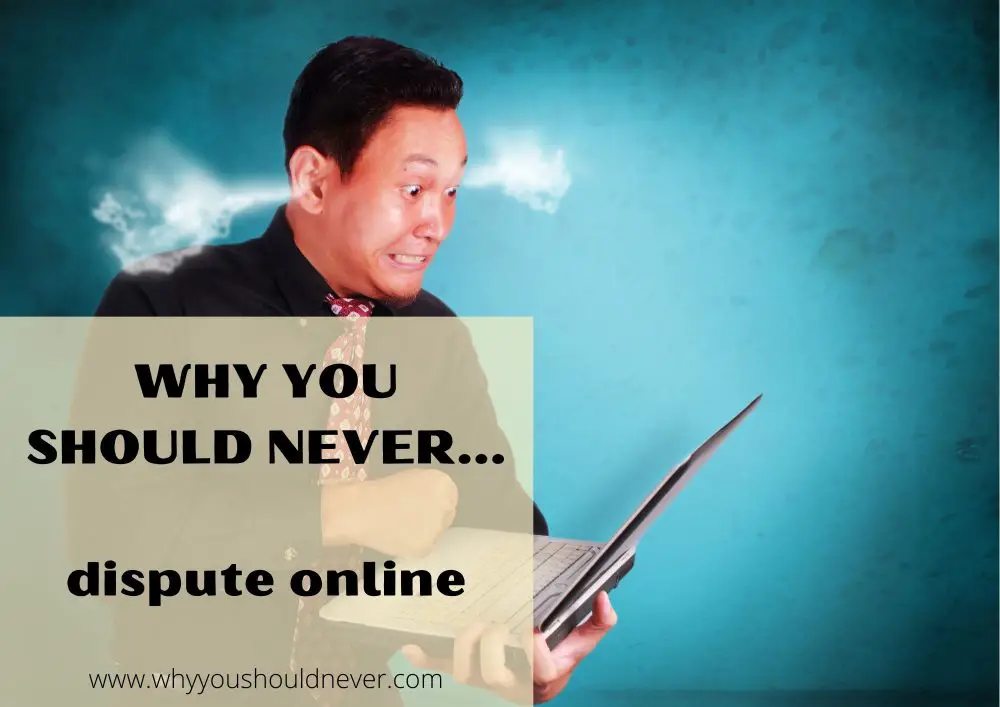![]()
Why You Should Never Dispute Online
It’s hard to resist the temptation to get into an argument with someone who has a different opinion than you, especially when that person is online.
Online, everyone is free to say what they like thanks to anonymity, everyone has time to formulate stronger arguments, and they can easily google information to fact check and support their claims.
Seems like a win-win situation, right?
Well, not really. The truth is, getting into online disputes is a royal waste of time and can have some unexpected repercussions.
This blog post will explore the reasons why you should never get into online disputes.
It’s counterproductive and a waste of time
If you’re engaging in an online disagreement with someone you don’t know, what exactly do you stand to gain?
I’ll give you a hint: nothing.
You could expend countless hours and energy disputing with a random person, taking time away from more important things, like learning a new skill or spending time with friends and family.
Winning an online argument might seem like it’s the most important thing in the world while you’re knee-deep in a brutal keyboard battle, but you’ll only walk away unfulfilled, your life unaltered in any meaningful way.
You won’t change anyone’s mind
Many people are keen to back down in face-to-face disputes, usually because confrontation makes them uncomfortable and it’s sometimes harder to defend their opinions and beliefs in person.
Such isn’t the case online, where people tend to hold firmer to their beliefs, under the guise of anonymity. They’re safe in the knowledge that nothing will come back to bite them in the rear.
Thus, it’s doubtful that anything you have to say will change a person’s mind; they’re secure in their convictions. They also don’t know you from Adam, so your opinions and knowledge won’t matter to them.
You might be arguing with a troll
It’s possible that you’re engaging in a back-and-forth with someone who is simply trying to provoke an argument.
This could be for attention, because they enjoy getting a rise out of other people, or just because they have nothing better to do with their lives.
Such people will play devil’s advocate and say incendiary things, knowing they’ll ruffle some feathers. They usually don’t believe half the things they say, but they’ll say them anyway because it will get to you.
As they say, don’t feed the trolls!
You could be arguing with a bot
There are also bots that have been programmed to generate arguments and provide a response online. They’ve become more and more sophisticated over time; you might not be able to tell the difference between a bot and a human’s writing.
Bots are often used to redirect you from the topic at hand, or to push an agenda and get people talking about certain topics. You’ll usually encounter them in places where discussions about controversial or political topics occur.
If your argument feels robotic or repetitive in nature, chances are you’re talking to a bot.
Your opinions might be used against you in real life
We’re not as anonymous online as we think…
When you consider how much of our lives take place online, it’s not surprising that the opinions we form and express in these spaces can have real-world consequences.
If your opinion is controversial or potentially inflammatory even within an anonymous forum, consider whether it would cause problems for you outside of this space before posting.
There are plenty of determined, Internet-savvy people lurking online, and they can, with enough time and skill, link your real-world existence to your online persona, if they don’t like what you have to say.
This could then affect your job or relationships.
It could be dangerous
Arguing online may seem like no big deal because it doesn’t involve any physical contact, but that does not mean that there are no risks involved.
As mentioned above, there’s only so much anonymity a person can have online, and the average person usually hasn’t done enough to protect their privacy.
This means that there’s always a risk that your true identity will be discovered by the person you’re arguing with; and depending on how bitter and spiteful that person is, they could find a way to get to you in the real world.
What is doxxing?
Doxxing is the process of finding out someone’s personal information and then posting it on public forums – social media platforms.
For example, if you’re arguing with another person online about your religion, they might release information about you to hate groups who could potentially show up at your house.
This could put you and your family members in danger.
Conclusion
Online disputes are never worth it because not only can they take an emotional toll on you, but there is always the possibility that they could escalate into something dangerous in real life.
So if you’re having a disagreement with someone online, the safest thing to do is simply disengage. It’s better for your safety and peace of mind.
